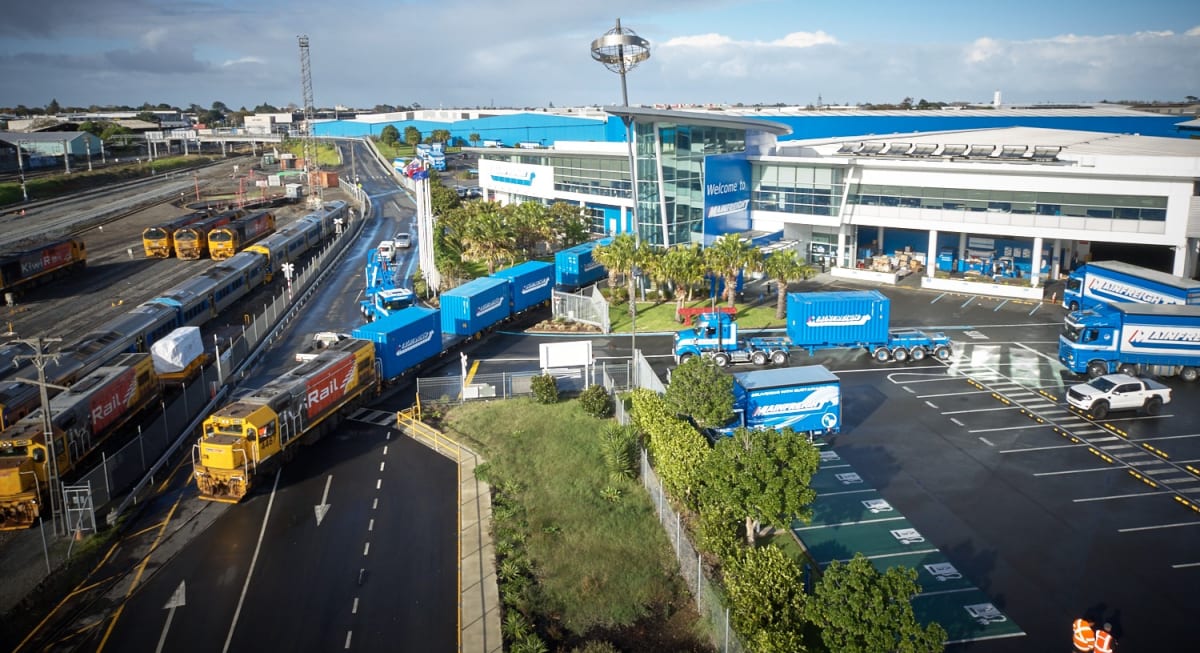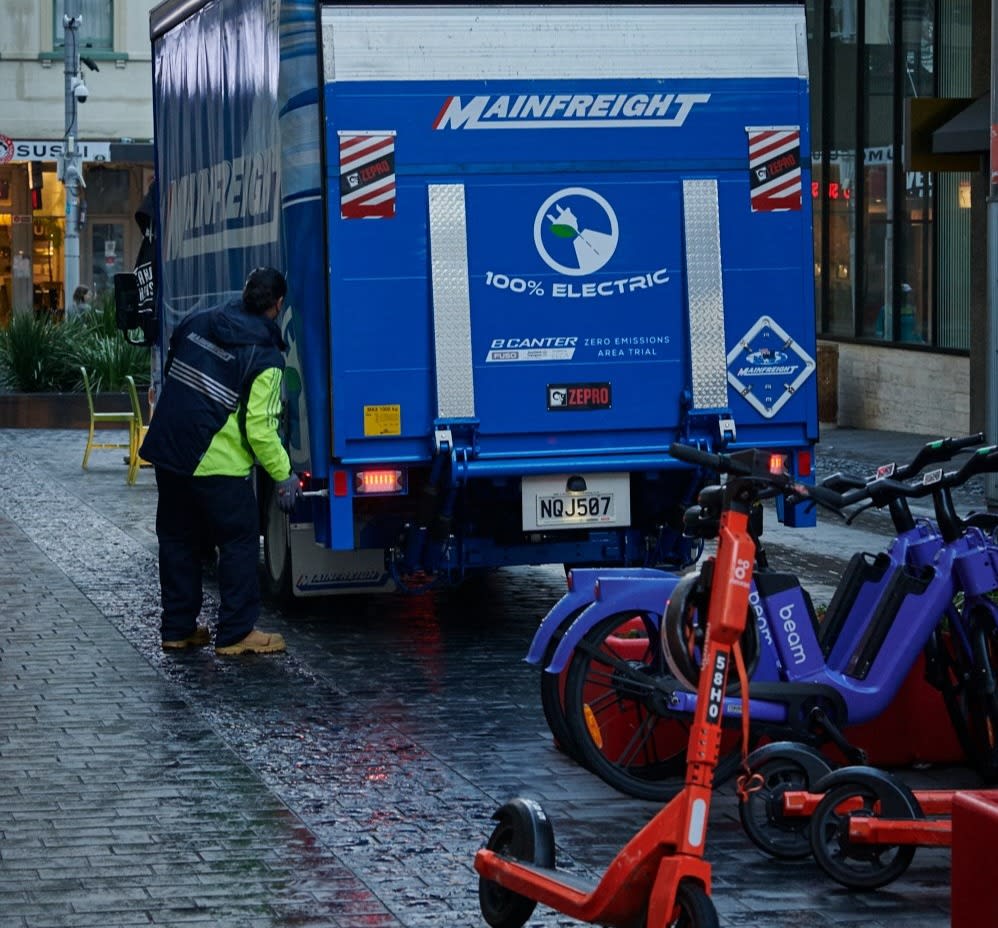
Pushed by the demands of the pandemic, Mainfreight managing director Don Braid says the logistics company will spend $540 million on new infrastructure
If there’s one theme that has come to epitomise the impact Covid-19 has had on many businesses it’s seriously congested supply chains.
Around the world, car production lines have been halted by a lack of semiconductors, liquor distillers have run out of bottles and retailers have experienced difficulties restocking inventories.
Just ask Mainfreight managing director Don Braid who admits that times during the past 12 months were like being in the eye of a storm.
“Both internationally and also domestically, the volumes of freight would come at us in waves and we needed to quickly find extra capacity. Imported product would be delayed and then would suddenly arrive on your doorstep.”
Braid says what complicated matters was that businesses all faced the same situation at the same time.
“If they could get product manufactured and they could get space, then they ordered more than probably what they needed, particularly in the categories that we operate in: food, beverage, DIY, fast moving consumer goods, perishables and pharmaceuticals in order to secure inventories. Everyone was buying all at once.”
For decades, businesses have prioritised costs above all else when selecting suppliers, building factories and deciding how much stock to keep on hand.
“We were even forced to store product in the aisles at times and people had to go and find temporary warehouses to absorb the increase in stock that customers were bringing in.” – Don Braid, Mainfreight
This philosophy has often been dubbed “just in time” stock management because it emphasised keeping inventory to a minimum and using short-term, flexible delivery contracts that could respond quickly to changes in demand.
Since the onset of Covid-19 “just in time” has rapidly morphed into “just in case” where businesses keep higher levels of inventory in reserve to deal with increasingly lengthily delays when it comes to restocking, putting additional pressure on logistics companies like Mainfreight to find extra space, often at very short notice.
The result created severe strains at times for the country’s leading freight and logistics business.

Frequently, Braid says Mainfreight’s warehouses were full to overflowing.
“We were even forced to store product in the aisles at times and people had to go and find temporary warehouses to absorb the increase in stock that customers were bringing in.”
As a result Mainfreight’s traditional service levels, which the company has always prided itself on, began to slip. Braid admits some customers suffered at times.
“When a customer called and asked us to move 20 containers and we could only find space for five, you feel somewhat upset by that. So there was a lot of frustration at times. But our people were magnificent at innovating solutions. They had to.”
"People still need to eat and drink, and whilst lockdowns have adversely affected a lot of other businesses, which we genuinely feel for, we were able to take advantage of the situation." – Don Braid
There was also an investigation in November last year that found some drivers felt forced into falsifying their logbooks and ditching mandatory rest times in order to make their runs on time, leading to transport agency Waka Kotahi asking the company to review four set routes.
Braid doesn’t condone drivers breaking the law and is adamant the issue has since been resolved.
“Look, we've worked really hard with our owner-drivers and Waka Kotahi and the New Zealand Police to make sure that what we do is by the letter of the law. There's no way in the world that we want our people to be falsifying logbooks or having to think that they have to work outside those driving hours.
"We actually had the road transport unit of the police speaking with our branch managers just a month ago in Wellington, and they got their message across very clearly, but they were also prepared to understand the difficulties we were operating under as well.”
Another record result
Despite a year when the business faced more logistical challenges than at any time in its history, Mainfreight still managed to deliver another record result with revenues climbing 47 percent to a record $5.2 billion in the 12 months to March, net profit before tax increased 86 percent to $489.4 million and a final dividend for shareholders of 87 cents per share, up 16 percent.
And not forgetting the record $134 million the company will pay in taxes this year.
While the result was helped by a global lift in freight rates, Braid admits it wasn’t the result he was expecting this time last year when Covid-19 was still raging around the world.

“We knew that we had some momentum but we’re also in a fortunate business. People still need to eat and drink, and whilst lockdowns have adversely affected a lot of other businesses, which we genuinely feel for, we were able to take advantage of the situation."
The outcome has led to Mainfreight announcing a significant commitment to increase its infrastructure with a $540 million investment being made over the next two years, of which more than 80 percent will be in land and building, mostly in New Zealand and Australia.
However, Braid remains cautious about how fundamentally the supply chain model has changed.
“Companies realise that they can't have too much stock. The capital cost of having it sitting in a warehouse and not being sold is obviously expensive. The good thing is that those decisions are being made around board tables right now and customers are being wise, but also a little wary.”
“The Shanghai lockdown is continuing to exacerbate the problem with shipping capacity out of China and of course, that flows on through the rest of the world’s shipping channels. The war in Ukraine is doing the same, particularly for air freight. It means we're going to have these problems for a while to come.” – Don Braid
And while the situation has caused plenty of headaches for Mainfreight it hasn’t seen any signs of a slowdown to date.
“The number of customers we have in our pipeline, wanting to warehouse with us, understanding the type of end-to-end services that we can provide has meant that we need to continue to invest in our infrastructure. The new warehouses we are planning will be leased, high quality facilities, which will change the game again on behalf of ourselves and our customers.”
Braid also stresses the importance of locating transport facilities close to customers to improve distribution efficiency citing Mainfreight’s new, soon to be opened, West Auckland hub as a good example of this approach.
“It’s a large facility and will mean freight into Auckland that needs to be delivered north and west will go there directly rather than to our main warehouse in South Auckland making things much more efficient for customers.”
Geopolitical concerns cloud outlook
Unfortunately for those hoping that supply chains issues might be about to ease as the severity of the pandemic begins to dissipate, Braid isn’t optimistic.
“The Shanghai lockdown is continuing to exacerbate the problem with shipping capacity out of China and of course, that flows on through the rest of the world’s shipping channels. The war in Ukraine is doing the same, particularly for air freight. It means we're going to have these problems for a while to come.”
Additionally, shipping companies are also having to deal with the International Maritime Organisation’s new sulphur restrictions designed to reduce their carbon footprint.
“Government should stay on the sidelines and allow businesses and shipping companies to work through the issues and they will get it sorted. The problems with our ports has come about as a result of our own incompetence.” – Don Braid
The new regulations mandates a maximum sulphur content of 0.5 percent in marine fuels globally which is intended to reduce the air pollution created in the shipping industry by reducing the sulphur content of the fuels that ships use. As a result, it will mean many existing vessels which are no longer compliant will have to be scrapped, further constraining the global shipping fleet.
As for the Government getting involved to ease the congestion, as has been proposed in a recent discussion paper on freight and supply chain issues, Braid characteristically doesn’t mince his words.
“Government should stay on the sidelines and allow businesses and shipping companies to work through the issues and they will get it sorted. The problems with our ports has come about as a result of our own incompetence.”

However, he does acknowledge there are also problems with current shipping schedules.
“I don’t think the shipping companies will exclude New Zealand from the trade routes, but certainly precedence is being given to the bigger routes. But the real problem with the schedules at the moment is that they’re so out of whack.
"The latest data I’ve seen is that only around 31 percent of current shipping arrivals are on time. Heavens, we wouldn’t survive if we delivered to our customers at that rate!”
Growing global footprint
Seventy-two percent of Mainfreight’s net profit after tax now comes from offshore and Braid believes that will only continue to grow.
“If you convert our US revenues to kiwi dollars it’s now our biggest business unit, but we’re still very small in the overall scheme of things. If you look at the total market size its around US$190 billion, and we’ve got barely half a percent of it, so the potential is enormous.”
It’s a similar situation in Europe where Mainfreight is also continuing to grow its footprint raising the obvious question if it still makes sense for the company to continue to be based here?
“Of course it does” Braid says emphatically.
"I think there’s a want from some of the politicians to move quicker, but the bureaucrats are constantly slowing things down. Someone has to cut through that at some point in time.” – Don Braid
“We’re a proud kiwi business and we love being listed on the NZX. Just because the business is bigger offshore doesn’t mean to say we have to uproot and move offshore.
Plus, our people continue to find opportunities here and our customers keep pushing us to do different things. So no, we have no plans to move.”
What does frustrate Braid is the speed of decision making in New Zealand, or rather the lack of it sometimes, something he has been critical of previously.
“The decision-making process, particularly within the bureaucracy, is so slow. We’ve seen that in evidence during Covid. I think there’s a want from some of the politicians to move quicker, but the bureaucrats are constantly slowing things down. Someone has to cut through that at some point in time.”

Mainfreight’s share price got within a whisker of $100 last year reaching a high of $99.78 in August. Will it get over $100 this year?
Braid admits to being mystified about the share price.
“Frankly, I think even some of the analysts are equally mystified how our shares are priced, but our job is to keep our foot on the gas and the share price will take care of itself."
After more than 20 years leading Mainfreight there’s no sense Braid is slowing down or contemplating retirement any time soon.
He is as passionate and enthusiastic about the business as ever, despite the operating challenges brought on by Covid.
“I’m still loving it and still having fun.”
Just don’t expect another record year next year warns Braid.







